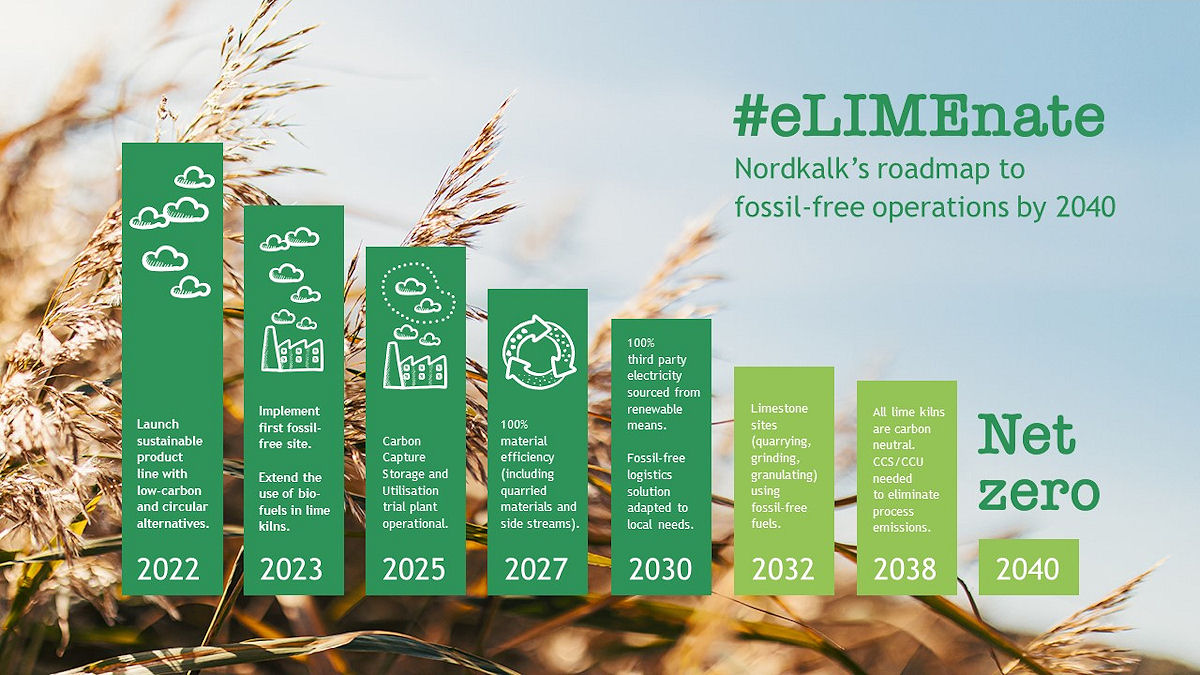
At Nordkalk, one of the eight focus areas in our Sustainability Programme is about reducing our climate impact. As part of this focus area, we have defined our road map and schedule on how we will reach net zero emissions by 2040.
Due to the nature of our business, there is not one single technical solution, which will solve the issue. Instead, we work with a number of solutions based on the local circumstances and prerequisites.
Our business is extracting limestone and processing it to lime and limestone products. These are used in our customers’ processes, mostly in direct environmental applications. Circular products made out of our own and our customers’ calcium-based side streams are also used alongside the natural limestone.
We have set a net zero emissions target for 2040, but it can also be sooner depending on the development of new technologies and availability of bio-based fuels.

Learning from the past
Before looking into the future, it is good to reflect on the past a bit. Since some years ago, we already have a couple of production sites that are very close to being carbon neutral.
In Ignaberga in the south of Sweden, we don’t have any fossil emissions from the milling plant. The next step will be to replace the diesel in the trucks and the transport from the quarry to the factory.
The Vampula plant in the southwest of Finland was given an internal environmental award many years ago for introducing biogas in the limestone mill and drying.
The Pargas quarry is since a long time ago hoisting the limestone by electrically driven conveyor belts; the crushing lines are powered by electricity and the recently renewed compressors are electrical as well. The first electric vehicles will arrive in Pargas early 2023.
So, we certainly already have fantastic examples to copy and to implement at other sites of our organisation.
Gradually getting rid of fossil fuels
Currently we are implementing interesting projects in several sites to reduce the use of fossil fuels. First solar panels have been installed in Miedzianka, Poland. Biodiesel has been used in quarry vehicles in Lappeenranta, Finland and in Storungs, Gotland Sweden. Good experiences are encouraging us to continue and to expand the use in the coming years.
Our main focus today is on eliminating the use of fossil fuels in the lime kilns. Fortunately, we don’t need to start from scratch here either as we have been testing different bio-based fuels in a smaller scale for many years. But now we will step up the process and go for sourcing of wood-based fuels and full-scale testing of bio-oil.
Our site in Köping in mid-Sweden will be the first site aiming to replace all fossil fuels gradually by the end of 2025. This will happen by a stepwise shift to more and more wood-based fuel and a minor share of bio-oil.
In our KPAB kiln on Gotland Sweden, we will implement a full-scale testing of bio-oil in the autumn and in Pargas Finland, we are testing wood pellets instead of firing coal.
Developing solutions for the future
To deal with the CO2 released from the limestone as it is burned to quick lime we will need carbon capture technology, which is currently studied in several projects. We aim at taking the first step in piloting the CCS – Carbon Capture and Storage concept through our Norwegian JV, NorFraKalk as soon as 2025.
Extensive R&D efforts will be made in order to learn more about carbon emission free lime processing. The study on usability and availability of biobased fuels continues in projects at Umeå University in Sweden. In a joint research programme at the VTT, Technical Research Centre of Finland, we have been involved in studying indirect calcining with electricity as energy source.
In the Fossil Free Lime project, funded by Business Finland and focused on the lime production in Raahe Finland, we are looking into all the different aspects of quick lime production as part of the steel-making process. As the steel making process is shifting to the use of Electric Arc Furnaces, there will be a demand for injection lime. This is now studied in a master’s thesis, which is just one example of the ongoing R&D work. Regarding the fuel, we will need to replace the existing coke oven gas. The options will be based on bio mass and/or some alternative gas based solution. Such alternatives are also studied within our R&D programme. Results will be available in the next few years.
Building blocks of brighter tomorrow
The road map towards Net Zero is defined and many required technical solutions are identified already today. Extensive R&D efforts are in progress. We are also committed to making the needed investments in order to eliminate the CO2 emissions in our production.
Lime and limestone will continue to be essential building blocks of the modern society in the future and will provide even more sustainable solutions for a brighter tomorrow.
Håkan Pihl

Håkan has just retired from the position of Director of Sustainability at Nordkalk. In this position Håkan was strongly involved in shaping the current Sustainability programme and the Road Map for phasing out the carbon emissions.
He shares more than a 3-decade-long history with Nordkalk in different functions, including R&D, Quality management, Production, Market development, Geology and Environment. Although retiring from the daily duties, he continues at Nordkalk in selected part-time tasks.